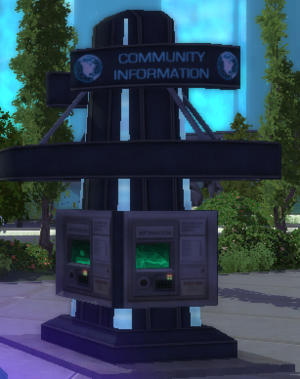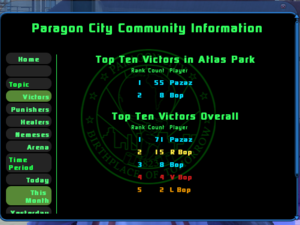Kiosks: Difference between revisions
From OuroDev
| (6 intermediate revisions by the same user not shown) | |||
| Line 1: | Line 1: | ||
[[File:Kiosk Model.png|thumb|Kiosk terminal in Atlas Park]] | |||
Kiosks, or Community Information terminals, are an in-game leaderboard for the stat tracker system. There are kiosks scattered all around blueside maps, but it’s not likely to find them outside of that. They were eventually left non-functional for performance reasons. | |||
[[File:Kiosk Leaderboard.png|thumb|In-game leaderboard window]] | |||
<br /> | |||
==Schema== | ==Schema== | ||
| Line 9: | Line 14: | ||
*Name: numeric ID of entry in vars.attribute | *Name: numeric ID of entry in vars.attribute | ||
The remaining columns follow this format, “Category_Period,” e.g. General_Today, Kills_ThisMonth, | The remaining columns follow this format, “Category_Period,” e.g. General_Today, Kills_ThisMonth, Time_Yesterday. | ||
Actions and events in MapServer increment or add to these columns. | Actions and events in MapServer increment or add to these columns. | ||
| Line 22: | Line 27: | ||
#DBServer regenerates, rotates, and broadcasts top stats periodically to all connected MapServers. | #DBServer regenerates, rotates, and broadcasts top stats periodically to all connected MapServers. | ||
<nowiki>*</nowiki> | <nowiki>*</nowiki>In merge request 205 this has been changed to load vars.attribute as-is | ||
===MapServer=== | ===MapServer=== | ||
#MapServer registers stat tables based off villain groups, zones, and common names — does not read vars.attribute. Names must | #MapServer registers stat tables based off villain groups, zones, and common names — does not read vars.attribute. Names must match DBServer's broadcasts | ||
#MapServer receives broadcasted stats and stores them in memory. | #MapServer receives broadcasted stats and stores them in memory. | ||
#MapServer records player statistics and flushes individual player’s updated stats to the database when the player is unloaded (zone transfer or logging out). DBServer reads the database and requires this data to be flushed to account for new stats. | #MapServer records player statistics and flushes individual player’s updated stats to the database when the player is unloaded (zone transfer or logging out). DBServer reads the database and requires this data to be flushed to account for new stats. | ||
Latest revision as of 09:33, 1 June 2021

Kiosks, or Community Information terminals, are an in-game leaderboard for the stat tracker system. There are kiosks scattered all around blueside maps, but it’s not likely to find them outside of that. They were eventually left non-functional for performance reasons.

Schema
cohdb.dbo.Stats
Three basic columns:
- ContainerId / SubId: Unique primary key to add multiple rows per character
- Name: numeric ID of entry in vars.attribute
The remaining columns follow this format, “Category_Period,” e.g. General_Today, Kills_ThisMonth, Time_Yesterday.
Actions and events in MapServer increment or add to these columns.
Process
DBServer
- DBServer loads vars.attribute
- Each var name is read into a global stashtable. The name are lowercased for case-insensitivity.*
- DBServer reads dbo.Stats and compiles a list of top stats per unique Name in a valid time period.
- DBServer regenerates, rotates, and broadcasts top stats periodically to all connected MapServers.
*In merge request 205 this has been changed to load vars.attribute as-is
MapServer
- MapServer registers stat tables based off villain groups, zones, and common names — does not read vars.attribute. Names must match DBServer's broadcasts
- MapServer receives broadcasted stats and stores them in memory.
- MapServer records player statistics and flushes individual player’s updated stats to the database when the player is unloaded (zone transfer or logging out). DBServer reads the database and requires this data to be flushed to account for new stats.
- If a client opens a relevant kiosk and topic, it generates HTML and sends it to the client. MapServer regenerates and sends new HTML each time a topic is loaded.
Client
- Client renders HTML in uiSMFView.